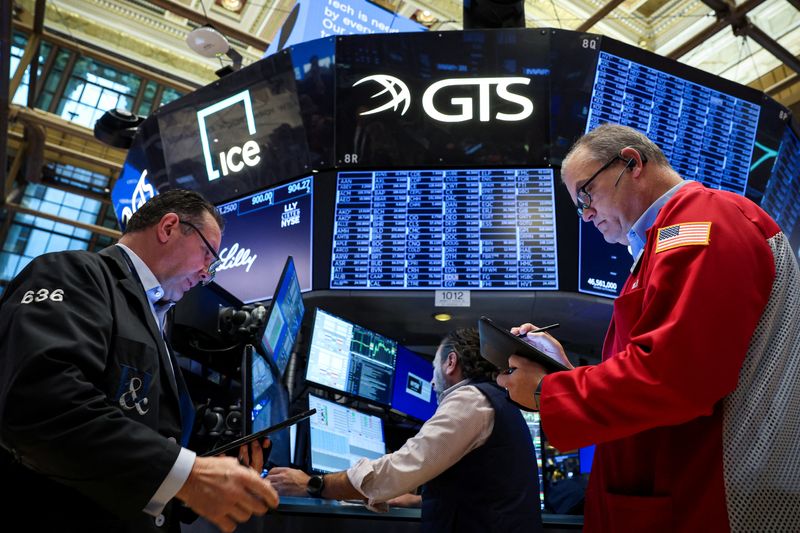A look at the day ahead in U.S. and global markets from Mike Dolan
Tesla (NASDAQ:TSLA)'s 20%-plus stock surge whets investor appetites for next week's earnings from most of the rest of the "Magnificent 7" of U.S. megacaps - with overseas markets keeping close tabs on weekend elections in Japan and next week's UK budget.
A relatively quiet end to a busy week sees market attention drift to numerous big events coming down the pike, not least the U.S. election in 11 days time. But the related edginess in the Treasury market earlier this week seems to have settled for now and the White House race remains far too close to call.
Relatively upbeat economic numbers on business activity, jobless claims and housing did little to disturb the slightly calmer bond waters - especially as business price pressures appear to have eased further and oil prices retreated again.
Ten-year yields hovered on 4.2% early on Friday, with the Federal Reserve's cyclical rate trough now seen as high 3.5% - close to Fed policymakers' highest estimates of the so-called 'neutral' long-term policy rate.
The dollar index also held the line with Treasuries.
For stocks, all the action was in earnings - with Tesla shares clocking their biggest single-day gain in over a decade as CEO Elon Musk's forecast of surging sales reassured investors he was still focussed on a core electric car business.
The stock spike puts Tesla shares back in the black for the year to date and now tilts the market to updates from the other six megacaps next week - starting with Alphabet (NASDAQ:GOOGL)'s quarterlies on Tuesday, Microsoft (NASDAQ:MSFT) and Meta (NASDAQ:META) on Wednesday and Amazon (NASDAQ:AMZN) and Apple (NASDAQ:AAPL) on Thursday.
Overall, the S&P500 ended three days of losses and closed marginally higher on Thursday, with futures up further ahead of Friday open.
Japan's yen nudged lower through 152 per dollar as Sunday's election results and Wednesday's Bank of Japan policy decision were awaited, with data showing Tokyo inflation ebbing this month against a backdrop of fresh government warnings about excessive currency moves.
For some investors, the risk of Japan ending up with a minority coalition government after the weekend poll raises some concerns that the BOJ could face complications in its quest to gradually normalise its super-easy interest rates.
Several recent polls have increased speculation the ruling coalition could lose its majority in parliament, which could cost new premier Shigeru Ishiba his job or force his Liberal Democratic Party to look for another coalition partner to stay in power.
And such a prospect may deprive the BOJ of the consensus support needed to push ahead with raising rates, some reckon.
Britain provided the other big focus of the weekahead, with reports of significantly higher borrowing to fund a public investment push unnerving UK government bonds on Thursday.
Finance minister Rachel Reeves said that next Wednesday she will announce a change to the measure of public debt that the government targets over a five year period in order to allow billions of pounds of more borrowing for investment.
Economists estimate that had this measure been in place in March, it would have created scope for more than 50 billion pounds ($65 billion) of extra borrowing, equivalent to about 1.5% of Britain's annual economic output.
In stark contrast to the retreat in U.S. yields on Thursday, the British bond market juddered at the prospect of higher borrowing tallies - with 10-year gilt yields hitting their highest in almost four months and the five-year yield premium over Germany reaching its highest this year.
The pound has held steady to firmer, however, showing no wider disturbance to investor confidence.
Elsewhere, most stock markets in Europe and Asia were higher on Friday - with Japan's Nikkei the underperformer.
Above-forecast German business confidence readings from Ifo eased some of the gloom about Europe's biggest economy - but there are persistent concerns about the country's mammoth auto sector as trade tensions with China build.
German automaker Mercedes-Benz (OTC:MBGAF) fell 3.7% after third-quarter earnings in its core car division massively missed estimates, while France's Valeo (EPA:VLOF) shed 7.5% as the automotive supplier cut its annual sales guidance for the second time this year.
Key developments that should provide more direction to U.S. markets later on Friday:
* US September durable goods orders, University of Michigan October consumer survey; Canada Sept house prices, August retail sales and government budget balance
* US corporate earnings: Aon (NYSE:AON), Colgate-Palmolive (NYSE:CL), Centene (NYSE:CNC), HCA Healthcare (NYSE:HCA)

* International Monetary Fund and World Bank Annual Meetings in Washington, speakers include German Finance Minister Christian Lindner, Budesbank President Joachim Nagel and Bank of Canada Governor Tiff Macklem
* Boston Federal Reserve Bank of President Susan Collins speaks
(By Mike Dolan,; mike.dolan@thomsonreuters.com)